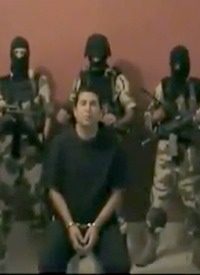
When 17-year-old Thelma Diaz showed up for work at Lolo’s Seafood restaurant on Tuesday morning, September 21, in Ascencion, Mexico, about an hour’s drive south of the New Mexico border, she had no idea that she would come close to losing her life.
Ascencion is known to be sleepy, dusty, hot, and dangerous. Since the first of the year, more than 40 people in that community have been kidnapped, with many of them being murdered and their bodies mutilated and displayed in public. It was a continual reminder that, for all intents and purposes, the Mexican drug cartels controlled the place.
But when a gang of thugs entered Lolo’s to abduct Thelma, brandishing the cartels’ signature weapon of choice, AK-47s, something happened. As she screamed for help, citizens nearby, armed only with fists and determination, chased the would-be kidnappers to the edge of town and began to dispense frontier justice. Fernando Saenz, age 63, had had enough. He told reporters later that he and a few other outraged citizens attacked the thugs with such ferocity that several of them broke some bones in their hands. When the police finally arrived, they succeeded in pulling the cartel members from the crowd, and locked them into the police cruiser.
But then something else happened. The outraged crowd refused to let the cruiser leave, and the “suspects,” suffering not only from the beatings they received but also the intense heat on that fearful day, died at the scene.
No one was charged, and since that Tuesday in September, there have been no more abductions in Ascension.
One of those who grew a backbone that day, Georgina “Coca” Gonzalez, helped form an armed citizens’ group. She said: We’re not proud of what happened [that day]. But we’re united now — the whole town. And we all want justice.”
Chihuahua is Mexico’s most violent state and with local authorities unable or unwilling to provide that justice, citizens have banded together to protect themselves and their communities. Gustavo de la Rose, a top human-rights official for the state, said that the flood of killings has resulted in the essential “collapse” of the legal system. Local citizens, like those in Ascension, are banding together on their own:
First, people wait for the government to deliver justice. Then they move on to the next phase, when they [dispense] it themselves. I think we’re now at the beginning of the second stage.
Victor Hernandez, a block captain for the volunteers, has divided the town into quadrants and has built a siren tower so that if a criminal act is taking place in town, volunteers are alerted and hasten to the scene. They also block the highway that runs through town at both ends. In addition, they have built a huge trench around the entire city deep enough to prevent four-wheel-drive vehicles from escaping overland.
The volunteers plan to turn suspects over to authorities, but are prepared to make suspects “disappear” if the authorities don’t respond in a timely fashion.
The citizen’s elected leader, Fernando Saenz, who helped in chasing down Thelma’s potential kidnappers, said, “This whole country is suffering. It’s time for people to take over, because the government isn’t doing its job. We have to take care of ourselves.”
Support for the volunteers even comes from the Mormon Church. Julian Lebaron, from just south of Ascension, said: “I don’t approve of the lynching here in Ascension, but the spirit of what happened here is what we need in Mexico.”
In addition to the siren tower, the group has also built a watchtower and every evening two members climb to the top and, using night-vision goggles, provide the eyes and ears that local authorities can’t provide. They are not vigilantes, says Lebaron: “We would call the authorities, but we wouldn’t sit around and wait for them to come help us. We would defend ourselves.”
Thelma’s rescue that day did something for the townspeople of Ascension: It awakened those who, until that day, were complacent. As this country continues its march toward tyranny, may its citizens awake from their complacency. As Glenn Beck wrote in his latest book “Broke,”
If you are waiting for a hero, then you are waiting for our demise. You are the hero. Our story is being written as we speak — find your place in it and remember that you don’t have to be the lead character to make a difference.
All it will take is backbone.
Photo: AP Images



